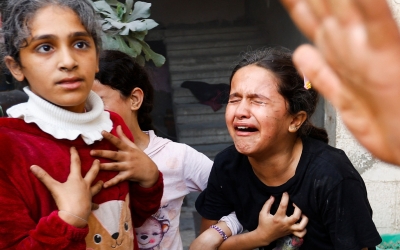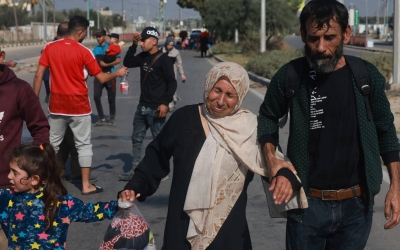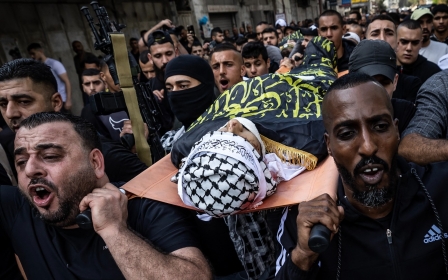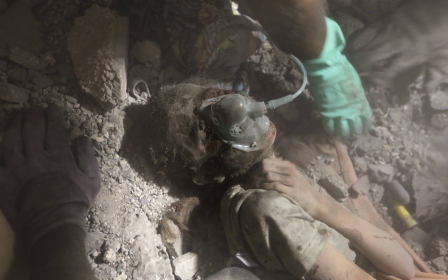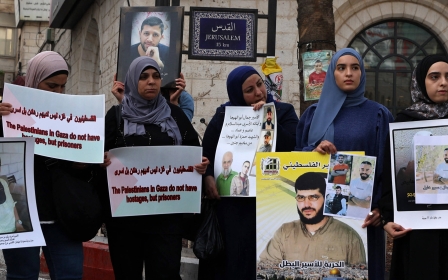Israel-Palestine war: Anxious families await children's release from prison
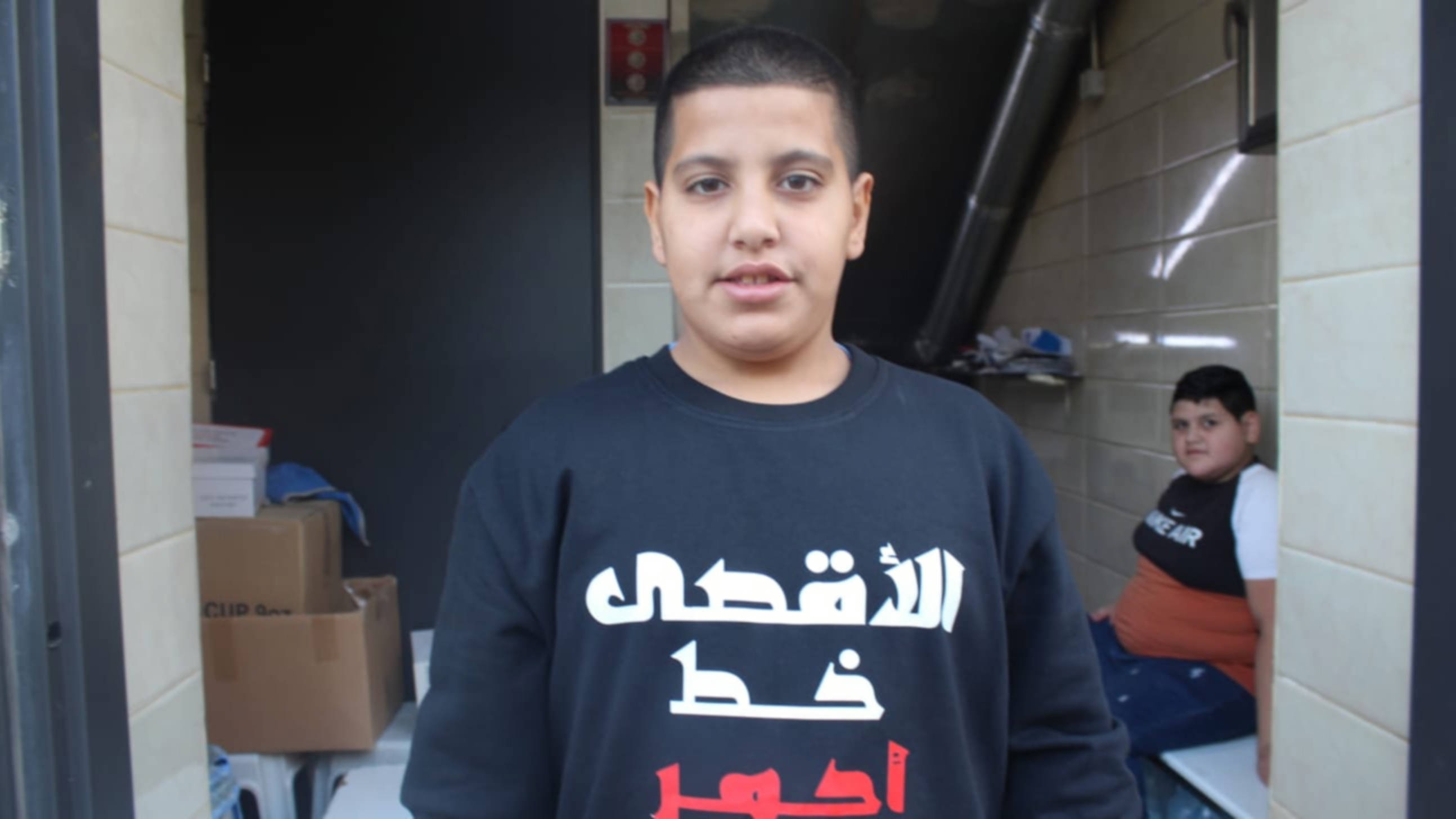
For days, the Salaymeh family has followed, with great anticipation, every piece of information related to a potential deal between Hamas and Israel to pause fighting and exchange prisoners.
And then on Wednesday, the two sides announced they had reached a four-day truce agreement, brokered by Qatar, that would also see the release of 50 captives held by Hamas in exchange for 150 Palestinian women and children from Israeli prisons.
Hamas captured around 240 people during a surprise attack on southern Israeli communities on 7 October, which killed 1,200 Israelis.
Seeing the name of their 14-year-old son Ahmed on the list published by Israeli media of the Palestinian prisoners slated to be released was a moment of great relief, cautious hope, and anxiety for Nawaf al-Salaymeh and his wife Sahar.
For Nawaf, such news can only be believed when he see his son with his own eyes, outside the prison.
New MEE newsletter: Jerusalem Dispatch
Sign up to get the latest insights and analysis on Israel-Palestine, alongside Turkey Unpacked and other MEE newsletters
According to the Palestinian Prisoners Club, more than 250 Palestinian children under the age of 18 are currently detained in Israeli prisons.
Ahmed has been imprisoned for months, and his parents cannot wait for the deal to be implemented.
'Our hearts were burning'
On 17 May, the Israeli police arrested Ahmed and three of his cousins from their homes in the Ras al-Amud neighborhood in Silwan, in occupied East Jerusalem, on charges of throwing stones.
After days of arrest, Ahmed was released under the condition of house arrest, where he was confined until 30 July.
“The Israeli police told us that they were not satisfied with the child being under house arrest and that he must surrender himself," his father told Middle East Eye.
"We handed him over while our hearts were burning."
Since then, Ahmed's family has never been allowed to visit him because his father is a former prisoner, while his mother holds a West Bank ID and was refused a visitation permit.
"He is currently in Damoun prison and we haven’t known anything about him since 7 October. There are no communications or visits," Nawaf said.
"We know that the prisoners are subjected to great pressure from the jailers. Our concern for his wellbeing increases every day.
"We are eagerly awaiting Ahmed's return, and we hope that all the prisoners will return to their homes," he added.
Ayham, Ahmed’s 13-year-old brother, was arrested a few days after his sibling's detention, and placed under house arrest, where he remains.
No celebration allowed
On Wednesday evening, the Israeli police photographed the homes of the prisoners scheduled to be released in Jerusalem and threatened their families with arrest if they showed any form of celebrating their release.
This type of restriction is not new in the city.
In recent years, Israel has suppressed any show of celebration when families receive their freed sons and daughters. In some cases, newly-released prisoners were re-arrested after their families had celebrated. In other cases, the freed detainees were deported from Jerusalem to spend the first days of freedom in the occupied West Bank.
The head of the Jerusalem Prisoners' Families Committee, Amjad Abu Asab, told MEE that suppressing people's celebration for the freedom of their children, after a long wait, is part of the state of perpetual distress that Israel seeks to impose.
Israel also subjects children arrested in Jerusalem to exaggerated harsh measures, such as high sentences, heavy fines, and house arrest, which, Abu Asab says, is not only a physical restriction, but also a form of psychological pressure that lasts for long months.
According to Abu Asab, beatings are the hallmark of the arrest of Jerusalemite children with the aim of intimidation.
"Since the settlers burned and killed the child Muhammad Abu Khudair in Jerusalem in 2014, Israel began increasingly targeting children in the city to prevent them from seeking revenge. It also developed its laws to double their sentences under the pretext of deterrence," he added.
The use of excessive force in dealing with children in Jerusalem is a systematic policy implemented by the Israeli police with the aim of subjugating them, he added, describing the conditions of their arrest and interrogation as more brutal than the rest of the detainees.
Denial of treatment, beatings that lead to fractures and bruises, constant threats, deprivation of education, delays in the courts, and complex conditions of release even after they are freed are all procedures that contradict international law, despite Israel’s signing of the Child Protection Convention 30 years ago.
Incomplete joy
In Yatta, a city south of Hebron, another family awaits information on the release of their 17-year-old son Baraa Rabi.
Bilal Rabi, Baraa’s father, said his lawyer had informed the family that their son would be among those released, without providing further details.
Baraa’s release would be the end of a year of suffering for him and his family.
In December 2022, Israeli forces stormed the family's home and arrested Baraa and his parents.
"They arrested me for 11 days and his mother for one day. They interrogated me about Baraa and his friends. They wanted to press major charges against him despite his young age, such as trying to shoot Israeli soldiers," Bilal said.
'We are impatiently waiting for Baraa, but we are distressed by what is happening in Gaza'
- Bilal Rabi, father of a prisoner
Baraa’s detention was extended several times, without him being convicted of any charges. According to his father, the Israeli prosecution has been trying to convince the judge to issue a long-term sentence despite the lack of evidence.
The presence of Baraa’s name on the prisoner exchange list was a happy surprise for the family, especially since they had only been allowed to visit him three times and have had no news of him for almost 50 days.
The family's happiness is, however, compromised by the death and destruction that Israel has wreaked in Gaza since the war started on 7 October. More than 14,000 Palestinians have been killed since; the vast majority are women and children.
"But this joy is diminished due to the Israeli aggression on the Gaza Strip, the rising number of martyrs, and the horrific scenes that we see," Bilal said.
"We are impatiently waiting for Baraa, but we are distressed by what is happening in Gaza."
Middle East Eye delivers independent and unrivalled coverage and analysis of the Middle East, North Africa and beyond. To learn more about republishing this content and the associated fees, please fill out this form. More about MEE can be found here.


